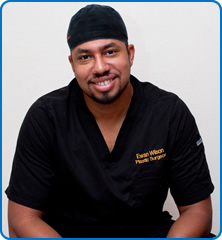Mr Ewan Wilson - Plastic Surgery

Year of first qualification: 2002, St Mary's Hospital - Imperial College School of Medcine
Specialty: Plastic Surgery
Clinical interests: Skin, Melanoma, Mohs & Reconstructive Surgery
Secrerary: Laura Bailey
Tel: 0117 414 6604
Mr Ewan Wilson trained in plastic surgery across London & East Anglia and has spent time at the MD Anderson Cancer Centre, USA.
He was awarded the prestigious Skin Oncology Fellowship in the UK.
His prime interest is Melanoma and all aspects of Skin Oncology .
He maintains an interest in general plastic, head & neck and reconstructive microsurgery and holds an MSc in Trauma Surgery.

